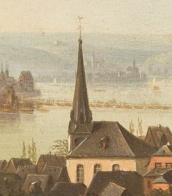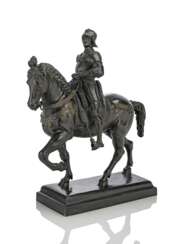андреа дель верроккьо (1435 - 1488)
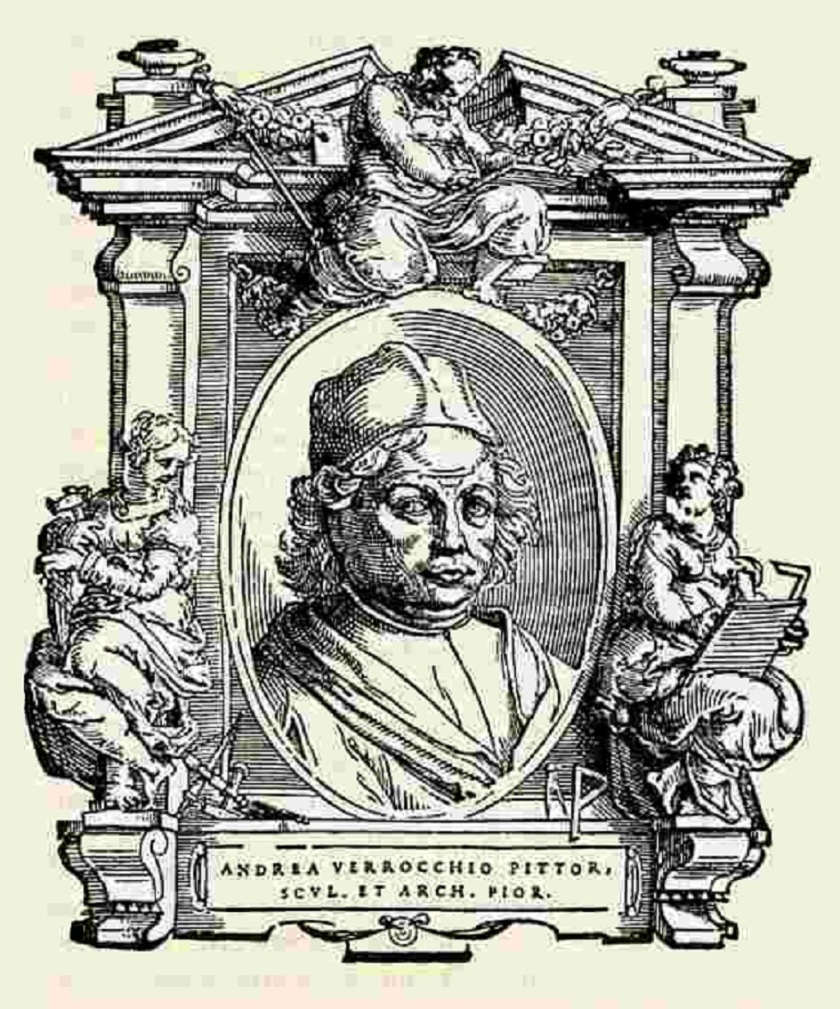
Andrea del Verrocchio, a prominent figure of the Italian Renaissance, was a master of multiple disciplines including sculpture, painting, and goldsmithing. Born in Florence around 1435, Verrocchio was a versatile artist whose influence extended far beyond his own creations, most notably as the mentor to Leonardo da Vinci. His works span a range of media, showcasing his expertise in both the sculptural and painterly aspects of Renaissance art.
Verrocchio's studio was a fertile ground for the incubation of Renaissance artistic talent. Among his most celebrated works is the bronze statue of David, commissioned by the Medici, which displays a youthful victor standing over Goliath, emblematic of Florence's civic pride and cultural ambition. This piece, alongside his equestrian statue of Bartolomeo Colleoni in Venice, exemplifies Verrocchio's skill in capturing dynamic figures and his innovative approach to bronze casting.
In painting, Verrocchio's contributions, though fewer in number, are significant for their exploration of depth and perspective, hallmarks of Renaissance artistry. His Baptism of Christ, for example, is notable not only for its own merits but also for Leonardo da Vinci's participation, which, according to legend, led Verrocchio to never paint again, outshone by his pupil's talent. However, this story is often considered apocryphal.
Verrocchio's legacy is cemented by the breadth of his work and the generations of artists he influenced. His adeptness across multiple forms—sculpture, painting, and goldsmithing—places him among the Renaissance's most versatile and influential figures. His sculptures and paintings remain pivotal in understanding the evolution of Renaissance art, characterized by a deep understanding of human anatomy, a mastery over materials, and an innovative approach to traditional themes.
For collectors and experts in art and antiques, Verrocchio's works offer a fascinating insight into the mastery and creativity of the Renaissance period. His influence on subsequent generations of artists underscores the enduring value and appeal of his creations.
For those interested in staying informed about upcoming sales and auction events featuring works by Andrea del Verrocchio, signing up for updates can provide exclusive access to the latest offerings in this realm. This ensures that enthusiasts and collectors alike remain connected to the vibrant market for Renaissance art, celebrating the legacy of one of its most distinguished masters.
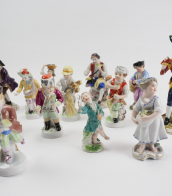

Andrea del Verrocchio, a prominent figure of the Italian Renaissance, was a master of multiple disciplines including sculpture, painting, and goldsmithing. Born in Florence around 1435, Verrocchio was a versatile artist whose influence extended far beyond his own creations, most notably as the mentor to Leonardo da Vinci. His works span a range of media, showcasing his expertise in both the sculptural and painterly aspects of Renaissance art.
Verrocchio's studio was a fertile ground for the incubation of Renaissance artistic talent. Among his most celebrated works is the bronze statue of David, commissioned by the Medici, which displays a youthful victor standing over Goliath, emblematic of Florence's civic pride and cultural ambition. This piece, alongside his equestrian statue of Bartolomeo Colleoni in Venice, exemplifies Verrocchio's skill in capturing dynamic figures and his innovative approach to bronze casting.
In painting, Verrocchio's contributions, though fewer in number, are significant for their exploration of depth and perspective, hallmarks of Renaissance artistry. His Baptism of Christ, for example, is notable not only for its own merits but also for Leonardo da Vinci's participation, which, according to legend, led Verrocchio to never paint again, outshone by his pupil's talent. However, this story is often considered apocryphal.
Verrocchio's legacy is cemented by the breadth of his work and the generations of artists he influenced. His adeptness across multiple forms—sculpture, painting, and goldsmithing—places him among the Renaissance's most versatile and influential figures. His sculptures and paintings remain pivotal in understanding the evolution of Renaissance art, characterized by a deep understanding of human anatomy, a mastery over materials, and an innovative approach to traditional themes.
For collectors and experts in art and antiques, Verrocchio's works offer a fascinating insight into the mastery and creativity of the Renaissance period. His influence on subsequent generations of artists underscores the enduring value and appeal of his creations.
For those interested in staying informed about upcoming sales and auction events featuring works by Andrea del Verrocchio, signing up for updates can provide exclusive access to the latest offerings in this realm. This ensures that enthusiasts and collectors alike remain connected to the vibrant market for Renaissance art, celebrating the legacy of one of its most distinguished masters.
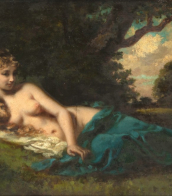

Andrea del Verrocchio, a prominent figure of the Italian Renaissance, was a master of multiple disciplines including sculpture, painting, and goldsmithing. Born in Florence around 1435, Verrocchio was a versatile artist whose influence extended far beyond his own creations, most notably as the mentor to Leonardo da Vinci. His works span a range of media, showcasing his expertise in both the sculptural and painterly aspects of Renaissance art.
Verrocchio's studio was a fertile ground for the incubation of Renaissance artistic talent. Among his most celebrated works is the bronze statue of David, commissioned by the Medici, which displays a youthful victor standing over Goliath, emblematic of Florence's civic pride and cultural ambition. This piece, alongside his equestrian statue of Bartolomeo Colleoni in Venice, exemplifies Verrocchio's skill in capturing dynamic figures and his innovative approach to bronze casting.
In painting, Verrocchio's contributions, though fewer in number, are significant for their exploration of depth and perspective, hallmarks of Renaissance artistry. His Baptism of Christ, for example, is notable not only for its own merits but also for Leonardo da Vinci's participation, which, according to legend, led Verrocchio to never paint again, outshone by his pupil's talent. However, this story is often considered apocryphal.
Verrocchio's legacy is cemented by the breadth of his work and the generations of artists he influenced. His adeptness across multiple forms—sculpture, painting, and goldsmithing—places him among the Renaissance's most versatile and influential figures. His sculptures and paintings remain pivotal in understanding the evolution of Renaissance art, characterized by a deep understanding of human anatomy, a mastery over materials, and an innovative approach to traditional themes.
For collectors and experts in art and antiques, Verrocchio's works offer a fascinating insight into the mastery and creativity of the Renaissance period. His influence on subsequent generations of artists underscores the enduring value and appeal of his creations.
For those interested in staying informed about upcoming sales and auction events featuring works by Andrea del Verrocchio, signing up for updates can provide exclusive access to the latest offerings in this realm. This ensures that enthusiasts and collectors alike remain connected to the vibrant market for Renaissance art, celebrating the legacy of one of its most distinguished masters.
